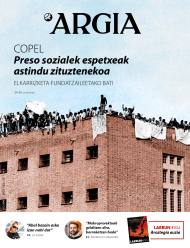A definition of what we are building
- Pomada is a literary and musical band made up of five women. They have created a performance on the first stage, called The Sketch for a Lover’s Dictionary, which mixes poetry and music. The islands are the starting point. We have witnessed one of the performances, in Amillena de Arrazola, Atxondo, Bizkaia. The following is a chronicle report.
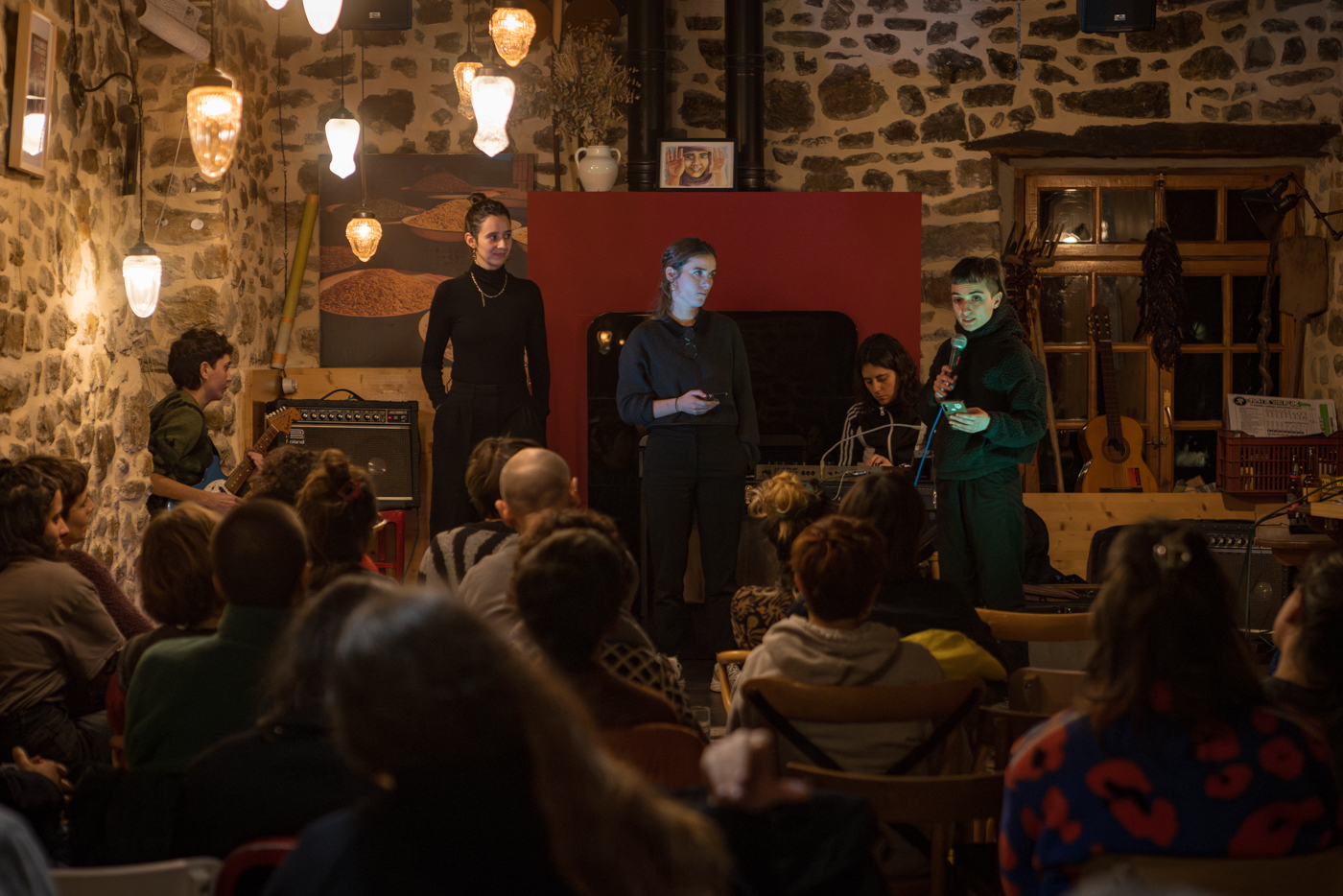
The dark has completely eaten up the blue sky, and the warm yellowing emitted by the windows of the restored building next to the church is the only light in the Plaza de la Arrazola. In the rural part of the stone house behind it, the metal arches of the greenhouses can hardly be separated, but the juicy aroma that spreads from the kitchen to the whole restaurant necessarily represents a fruitful harvest, even in winter. Amillena is a self-managed project that advocates food sovereignty and transformative culture in the broadest understanding of culture. Here, the food goes directly from the floor a few meters away to the dish, passing through the kitchen next to the bar. Or from the orchards of the producers in the area to the jars of canned food on the shelves on the wall. Peppers, honey and cheeses. Craft beers and juices. On today’s menu: chicken or vegetable empanadas, mushrooms, onions and pumpkins. United in the house paste. And, of course, poetry.
This is the first performance in this year’s cycle of Pleasures, by the hand of the Pomada Banda formed by the poets Lizar Begoña, Elena Olave and Eva Pérez-Pons, and the musicians Andrea Plaza and Amaia Villanueva. Placerkekeria is a place for artists who are both women and dissident sexual genders. There is no entry charge: the metal financing boat passes by hand and there are also umbrellas for sale that bear the name of the cycle. “Not very good, but made with love”, in the words of a co-operative. Here’s how things are done: with honesty and humility, aware that small actions juxtaposed can be a protection against torrential rain. And even when you don't get it, with love.
This is how the people who came to see, hear and taste each other today have also met: many are known and when they enter they have embraced those who were inside, or they ask each other how they have started the year, with their hands on each other’s arms. Friends back in their 30s, 40s, 50s, even someone close to 60. Short hair irregularly clipped by the hairpin, long hair tied by braids and tweezers, vests, eye-catching transparent jackets and a polo shirt stolen from the father. We ended up putting them in wooden seats. We are a heterogeneous whole that can be united by some strings, with dishes on the lap and a gaze on the stage, as attentive as with serenity.
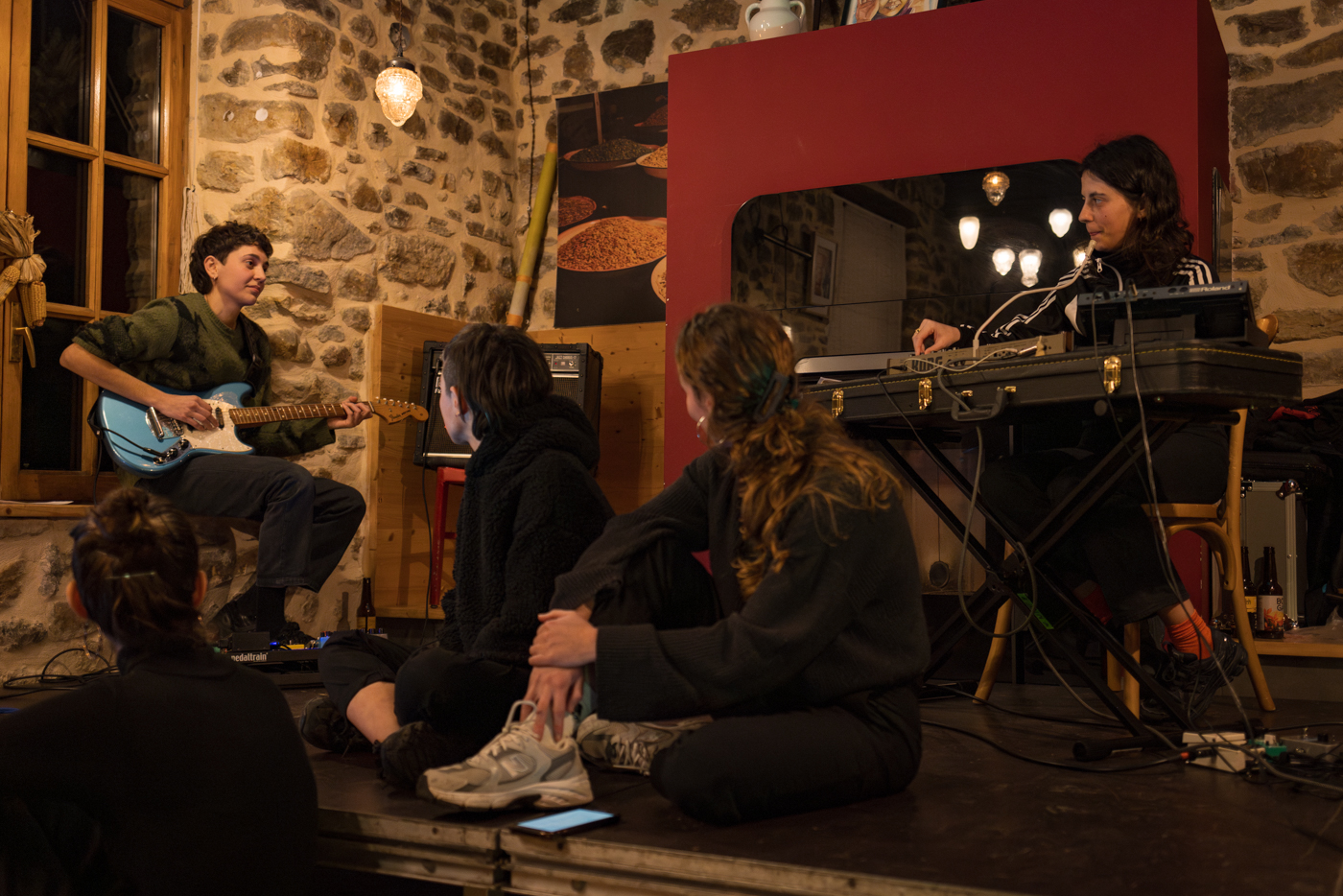
A sketch for a lover’s dictionary is also the name of this first performance created by Pomada. After its premiere in Erandio and its performance in the San Sebastian Feminist Festival, today they have their third pass. The first one can be represented from the Instagram photo of the band: guitars and musicians accompanied by synthesizer tables on one side, the poet seated two on the other, and a third one approaching the micro footstool. Today, however, the stage has been taken in a different way by the bodies: on each side there are the musicians, the poet with two sets on the edge, and the third in the center of it, standing and with the microphone in his hand.
“In Erandio we didn’t pay attention to the way we were on stage,” they explain in our interview before the performance. “We were very static and we were afraid to bore people, too.” The actress Ainhoa Artetxe was asked to work on the support movement, although she did not intend to get too close to the theatre.
"The offer that comes from institutions when you are young does not meet your needs"
The body that is standing in the hand has the mobile, and the words go from the screen to the voice and from the voice to the speakers. Opening: welcome to the island of lovers. Starting from the concept of the island: places to imagine and start building other worlds, fleeing from the dominance of the continent. Because they will refer to lovers, yes, but the ISLANDS will start from the word; in the plural, because there are many, fleeing from the rigidity of the imposed mold, ways and places of doing and being. That's what they said from the microphone: “There are extra-official worlds within the official world, other political orders. (...) We, our island, the island of lovers, have desgled. The I-R-L-A-K. We come to reinvent some of the words behind each letter.”
The book of the same name by Monique Wittig and Sande Zeig was the first seed to create the performance, looking at the hook launched by Iñigo Astiz, who proposed them to make a public piece in Erandio. Monique Wittig, a 20th-century Transfeminist philosopher, also influences the current thinking of the Basque Country, mainly because of his essay Heterosexual Thought, published in the Lisipe collection. The paper considers lesbianism as an escape from the category of women and proposes the keys to the abolition of gender.
Wittig wrote in collaboration with his lover, film director Sande Zeig, Brouillon pour un dictionnaire des amantes, which was given to another by a member of the Pomade in August, from which the islands began to rise from the sea, along with all the words between the letters. Here are the four hands of the last century that were written 50 years ago: “The aim has also been to capture the imaginary associated with our current community, the Basque cuirre community. So that it may be written somewhere, even if it is lost in orality, that it may have a place.” Although it is difficult to receive them all, as suggested in the performance: “There are not all the letters or words in this dictionary because we don’t know them yet, we haven’t found them. We are learning and building the language of lovers.”
Voices on stage have retreated into the vocabulary and left us alone, surrounded by the soundtrack of an awakening world. The synthesizers take their presence as the light spreads in the morning. They nurture our curiosity for the land we are about to explore so that it begins to be tailored to tropical leaves.
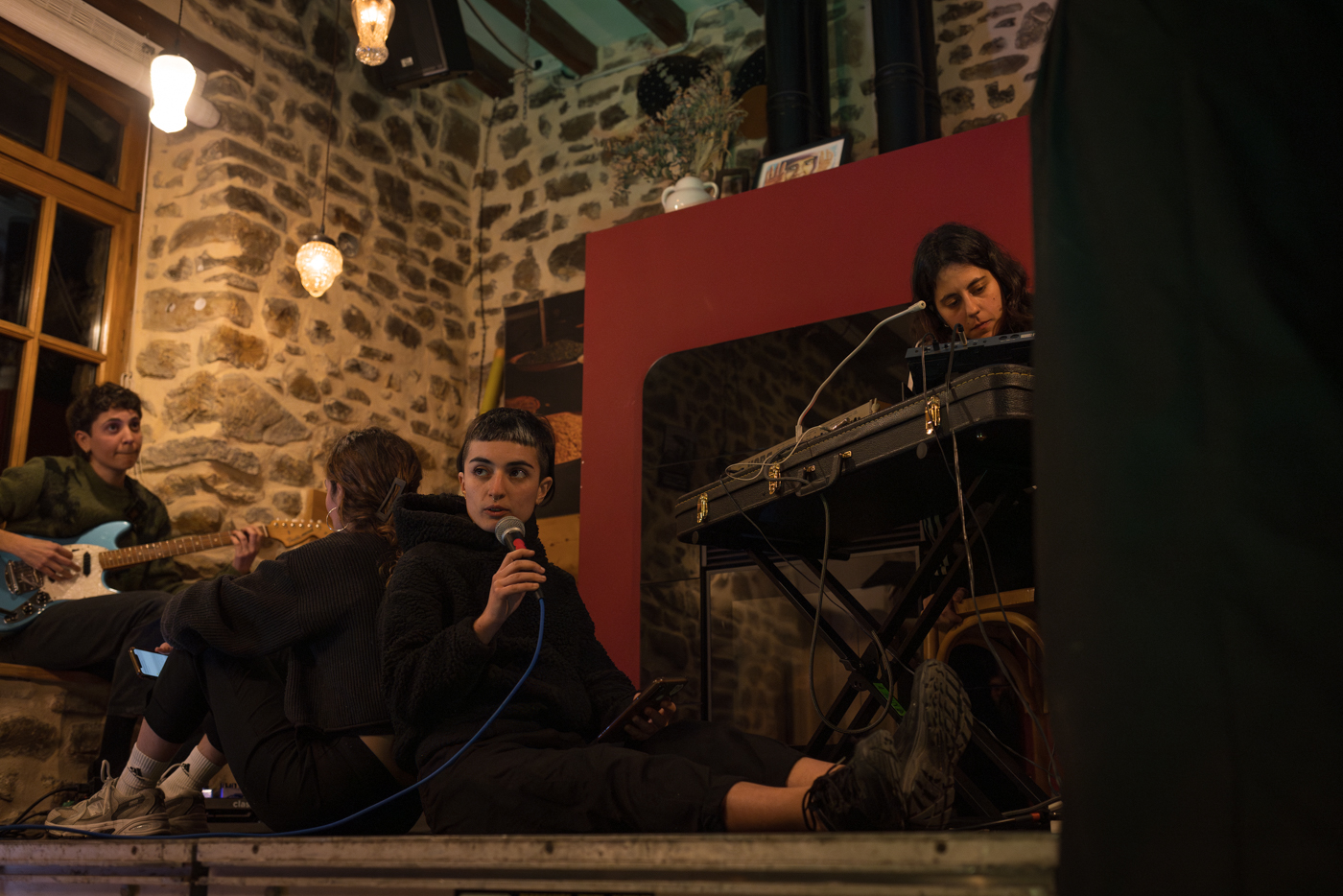
I At
last the melodies of the jungle have been reduced, and they have allowed us to expand the vocabulary: With the letter I, intimacy, insult, illusion. Poets standing, colliding, marking the sides of a triangle. And the words also three edges, drawn by three different languages: cut sounds and rhymes, on the one hand, slander turned into sharp weapons, on the other, and words with sufficient force to construct and deconstruct realities, on the other. Lovers who do not manage to release the weight of the old world even in front of those closest to them, who not only want to make cracks in the norm, but also to twist libraries, schools, bars, toilets — “wow, toilets!” — who would like to weigh the materiality of the reflections in the mirrors. Illusion marks the path to the ideal, but in what direction do the mirrors around us project the lights?
It is said that poetry makes it possible to recover or restore the various meanings of words. In this case, the view of poets is evident from the first definitions: they consider language as a tool to bring to light the hierarchies that social structures allow. Starting with the title of Wittig and Zeigen, a member of Pomada explains to us: “The reading I made myself was that, when talking about lovers, the book was not only about those who share sexual relations, but that, within the community, they are all lovers. Your sideball is a lover, and so is your lover. This is how I understand love, in this case: the love of the collective. And it is far from the understanding associated with duality and heterosexuality. It’s love for a world: love for what we want to build and where we are.”
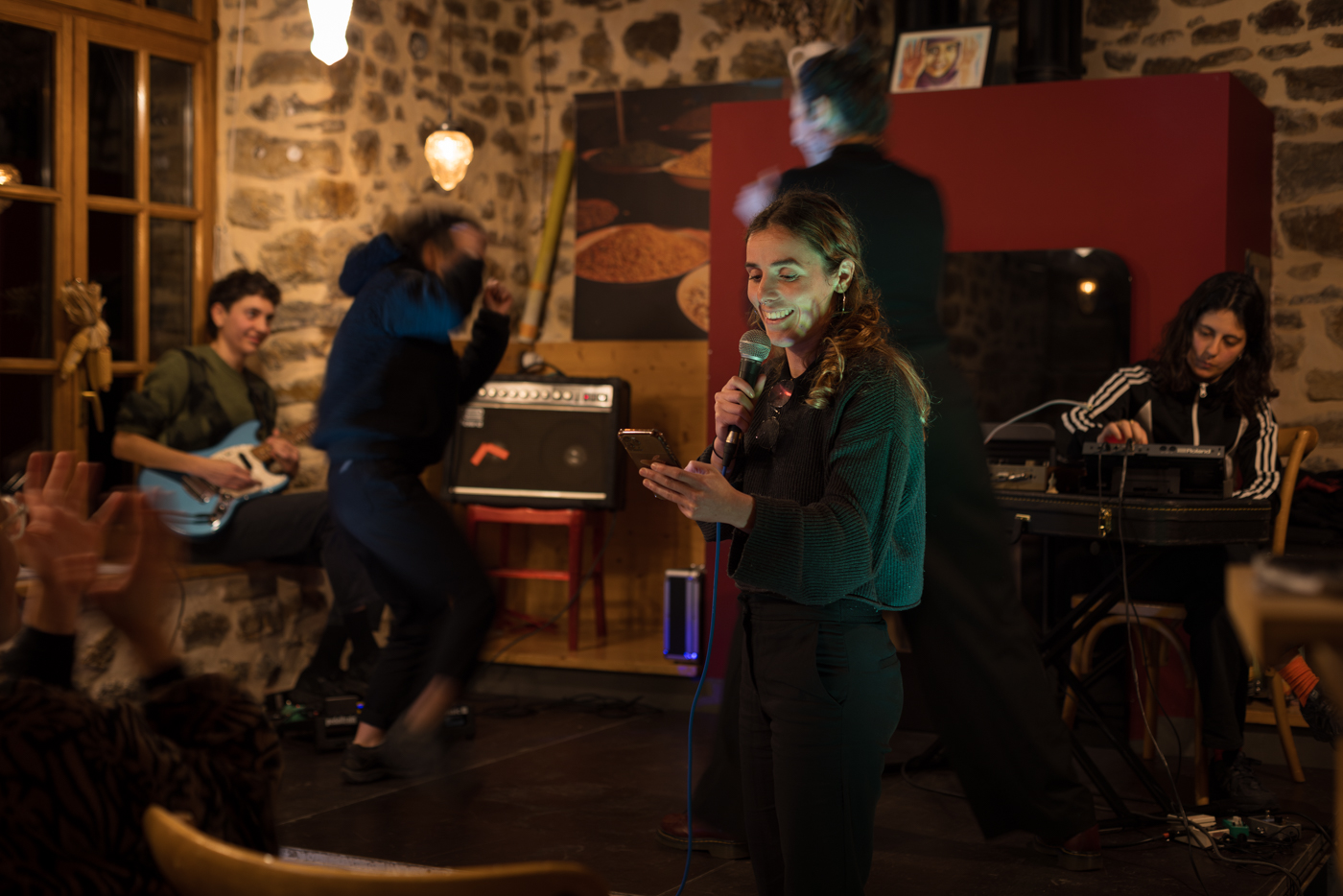
To begin
the letter R R, one of the bodies descends to the ground. He leaves the other two sitting on their necks in the middle of the stage. Starting with R, Rummikub, Romeo and Rocio. A favorite board game of some lovers, an archetypal lover, and a special, particular name. Game, written and new meaning, in the same letter. The first initiative announced by Pomada could also be said to link these three: after meeting in initiatives organized by institutions and associations to launch LGBT+ poetry, they decided to organize a meeting day in search of ways to live literature to suit them and make room for other bodies and aspirations. They also collaborated with the poetry group Mejillón Tigre.
One of the members of Pomada says that the objective of the time was to be able to act “in company and in a more dirty or informal way”; “and meet people”, the other. “Especially people who write poetry and don’t publish it.” Held in Bilbao’s 7gatos youth centre last April, the morning workshop brought people together and encouraged them to participate in the afternoon public. “The very fact of giving people space was significant: having the opportunity to get on the stage without being a writer, without having anyone—hence the name. People were grateful.” Because the writer label is necessarily associated with passing certain milestones and responding to certain requirements. In a different way, but even then they sought to fulfill the same function assigned to poetry: “To make and re-anahue the codes of the literary system.” “What is good poetry? We didn’t want to work on that logic.”
It would not be a horror to place this intention of the Ointment within a wider stream. In just over a year, the Basque Country has seen the appearance of Banda Baja, the youth magazine Izanen, and self-managed reading clubs such as Underarra. All of them were created by young people and based on a shared line: the intention of living literature outside the market logic and questioning regulatory quality parameters. They contrast with the reading clubs in the libraries that we imagine filled with beautiful ladies. “I think that when you are young, the offer that comes from the institutions does not meet your needs,” explains a member of Pomada, “because it is a very orthodox offer, made without knowing it, and also from a complex of saviors.” It is not surprising that most of these projects also share a critical and politicized look.
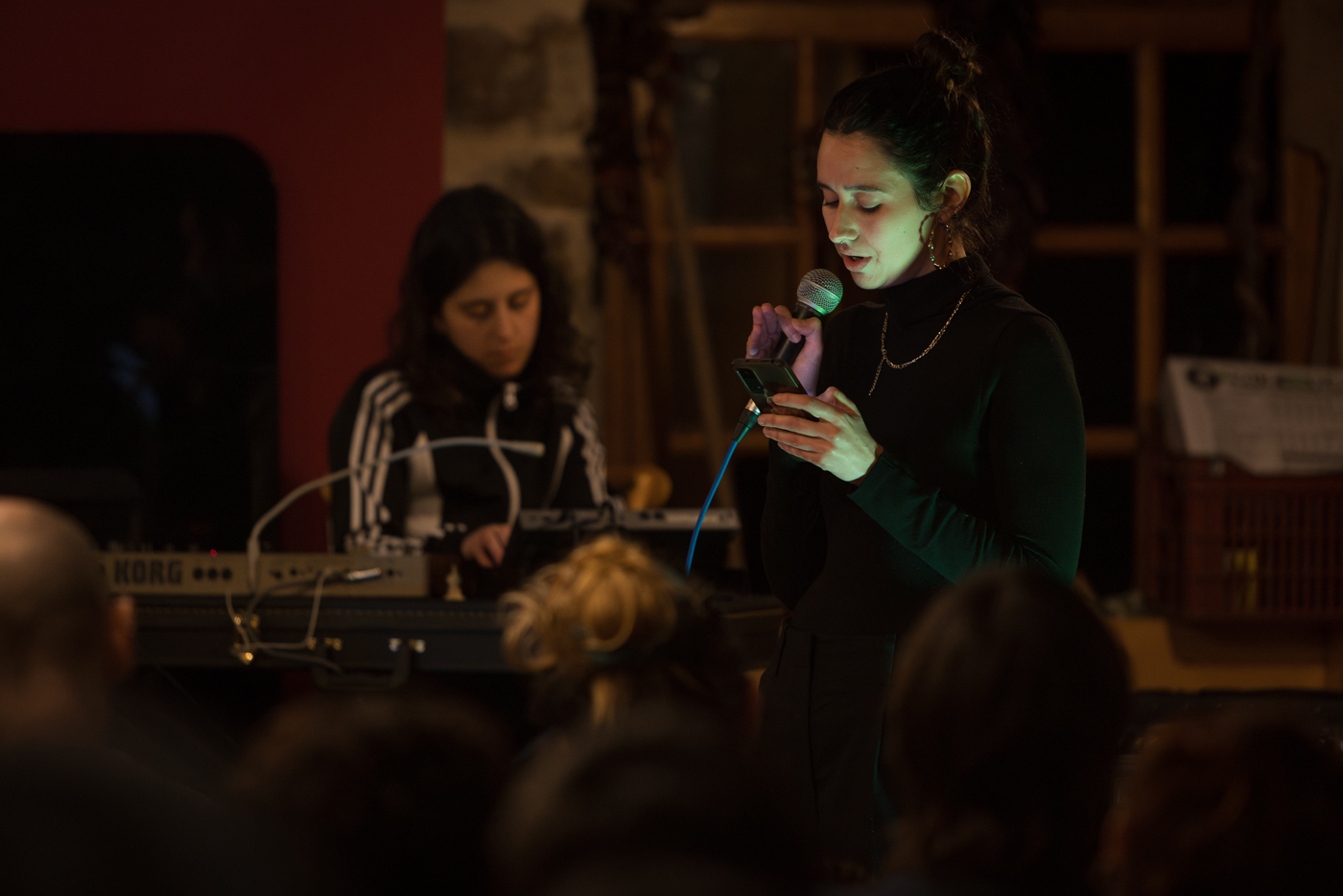
Back to
the delicacy of L Amillena, we face the three poets standing on the stage. With the letter L, shame, glory and feather have been defined. On the island of lovers there is no shame: it is something ancient, unlearned, although they still remember the dances, games and foods that they used to face it. Perhaps it is only by overcoming the shame that this glory that brings physical pleasure, which lovers know so well to find and proclaim on the edges of life, appears.
This has been accompanied by several definitions of the pen. Even the last one I don’t know. “Our lovers grow feathers when they don’t like the world around them.” Lovers find their words sought after by the edges of the tongue.
A The
words that begin with the letter A that will give us hidden by the other two bodies also come to this: the coat that we usually forget, the lover that we have stolen from the songs of the south, and the animal that we release when we dare to dogs.
Even outside the stage, the Ointment only delves into this. In fact, they like the language of the Internet, and in their Instagram account, mainly poets such as KPMZ, uwu and sssuport, you can find slogans such as the hated polysis. “There is also the fact that in other environments you have to speak in very serious ways. Following the New Style Book. In the university... If this is our project, let’s talk about it the way we do it.” Without fear of tarnishing the language that, although imposed on all, belongs only to some. “The 50-year-old straight poet won’t understand us. The 21-year-old Marika. Our goal is to get to the second one.” “And I’d like to hear that the 50s say we’re perverting poetry,” they laugh. “Tell them we don’t know Russian. That’s what I want.” They have internalized the dynamic of reappropriation of the offense. Without a doubt.
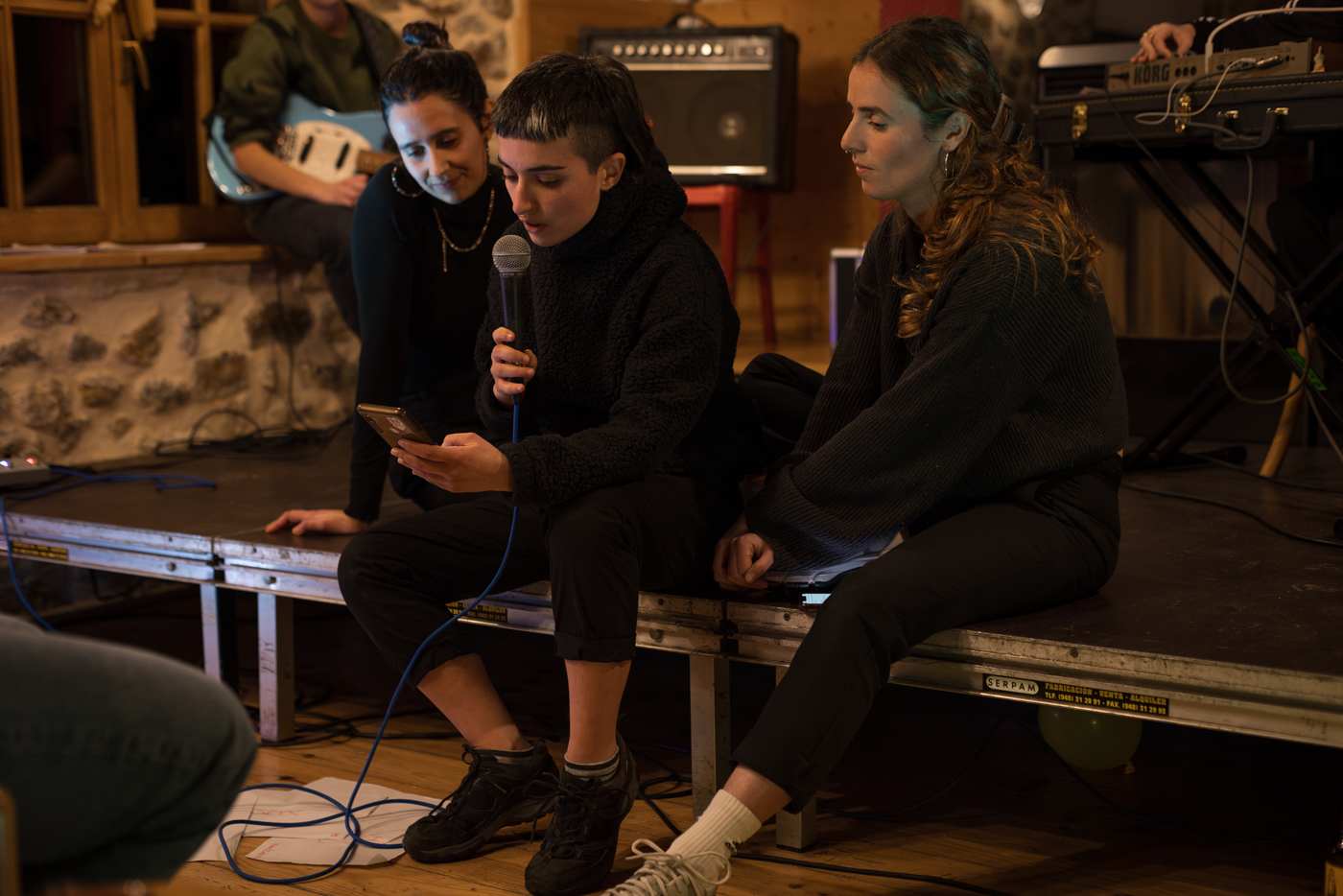
K
The last letter. Clonopine, a peace pill that is bought in pharmacies, a cry for cocoa and its secretory, and the animal of the heart of lovers: the cat. Old Song of Bizkaia updated and all. The three of them sitting in the middle of the stage, one in the middle, a little further forward, and the other two of them watching from the sides. Bodies, poets, lovers. Complicit looks and crossed smiles. The music has taken up the room again and they have remained there, forming a triad, favoring each other for the last 45 minutes, interacting, after moving together, at this point only one body, as many as three individuals.
"The 50-year-old straight poet won't understand us. The 21-year-old Marika. Our goal is to reach the second.”
The spell lasts a few seconds after the music stops. Finally, the bodies stood up and the applause made their way. On the stage, laughter and arms seated on each other's shoulders. But the public did not suddenly rise. It requires calm to place new words and nuances in the vocabulary. It is a land that we hardly collect, but which grows in the island of lovers among trees and sand, accompanied by calm, chera and warmth. Today they sent us a trail in an envelope to Amillena. The whisper of the familiar voice came from behind me: “I forgot that I was here.”









